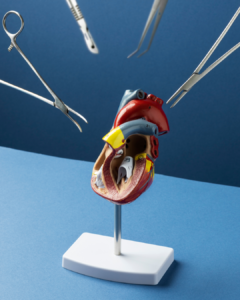Car Accident Organ Damage: Hidden Dangers & Recovery Care
Car accidents are among the leading causes of internal organ injuries, which can be both devastating and life-threatening. Unlike cuts or fractures, organ damage is often invisible in the early stages, making it especially dangerous. A victim might walk away from the accident scene feeling fine, only to experience severe complications hours or days later.
At Specialty Care Clinics, we specialize in diagnosing and treating organ injuries caused by car accidents. From rapid emergency care to long-term rehabilitation, our team ensures patients receive comprehensive treatment for safe and complete recovery.

Common Types Of Organ Damage After Car Accidents
Organ damage can result from blunt trauma, penetrating injuries, or fractures caused by the force of a collision. The most commonly affected organs include:
- Spleen Injuries – The spleen is highly vulnerable in auto accidents. Ruptures can cause internal bleeding.
- Liver Damage – One of the most common abdominal organ injuries, which may lead to severe hemorrhage.
- Kidney Trauma – Often caused by direct impact to the lower back or side of the body.
- Lung Damage – Broken ribs or chest trauma can puncture or collapse a lung.
- Heart Injuries – Though rare, severe blunt trauma can damage the heart muscle or vessels.
- Intestinal & Bowel Injuries – Tears or perforations may cause leakage and infection
Symptoms Of Organ Damage After Car Accidents
Many victims mistake organ injury symptoms for simple soreness or muscle strain. However, early recognition is crucial. Watch for:
- Severe abdominal or chest pain
- Nausea, vomiting, or blood in vomit
- Dizziness, fainting, or confusion
- Shortness of breath or chest tightness
- Swelling or bruising around the abdomen
- Blood in urine or stool
- Weakness or pale skin (sign of internal bleeding)
- Rapid heart rate and low blood pressure
If you notice any of these symptoms, it’s vital to visit an auto injury treatment clinic immediately.
How Organ Damage Is Diagnosed
At Specialty Care Clinics, we use advanced diagnostic techniques to ensure accurate detection of internal injuries:
- CT Scans & MRIs – Provide detailed images of organs and internal bleeding.
- Ultrasound (FAST Exam) – Detects fluid accumulation around organs.
- Blood Tests – Evaluate organ function and detect internal blood loss.
- X-Rays – Useful for detecting rib fractures and related chest injuries.
- Physical Examination – Identifies tenderness, swelling, or abnormal vital signs.
Because organ damage is not always visible, prompt medical testing is the only way to confirm injury.
Treatment Options For Organ Damage
Treatment depends on the organ affected, severity of injury, and overall patient health. Options include:
- Observation & Monitoring – Minor injuries may heal naturally with rest and careful monitoring.
- Medications – Pain relief, infection control, and medications to stabilize organ function
- Surgical Repair – For ruptured spleen, liver lacerations, or perforated intestines.
- Minimally Invasive Interventions – Interventional radiology to seal bleeding vessels.
- Organ Removal (Splenectomy) – Sometimes necessary if the spleen is severely damaged.
- Rehabilitation Programs – Physical therapy, diet guidance, and lifestyle changes to promote recovery.
At our auto injury clinics in Texas, we provide personalized treatment plans tailored to each patient’s needs.
Long-Term Risks Of Untreated Organ Damage
Ignoring organ injuries can result in:
- Severe internal bleeding
- Organ failure (kidney, liver, lung, etc.)
- Life-threatening infections
- Chronic pain and reduced quality of life
- Permanent disability or death
Timely treatment at a best auto injury treatment center can save lives and prevent complications.
Why Choose Specialty Care Clinics?
Patients trust Specialty Care Clinics because we provide:
- 24/7 emergency trauma care
- Expert surgeons and internal medicine specialists
- State-of-the-art imaging technology
- Complete rehabilitation support
- Patient-centered care focused on safety and recovery
Whether your injury is minor or life-threatening, we ensure you receive the highest level of medical attention.
Conclusion
Organ damage after a car accident should never be underestimated. Because many symptoms are hidden, the safest option is to seek immediate medical evaluation—even if you feel fine.
At Specialty Care Clinics, our dedicated team is trained to detect, treat, and manage organ injuries effectively. From emergency care to rehabilitation, we guide patients through every step of recovery.
Don’t wait until symptoms worsen—get evaluated today at one of our auto injury clinics in Texas.
FAQs About Organ Damage After Car Accidents
- Can organ damage occur in minor car accidents?
Yes, even low-speed accidents can cause organ injuries, especially to the spleen, liver, and kidneys. - How long does recovery from organ damage take?
Recovery may take weeks to months, depending on the organ affected and treatment required. - Is surgery always required for organ damage?
Not always. Some injuries heal with monitoring, while others require surgical repair. - What organ is most commonly injured in car accidents?
The spleen is the most commonly injured organ in blunt trauma from auto accidents. - Where can I find expert treatment for organ damage in Texas?
At Specialty Care Clinics, we provide advanced trauma care and complete recovery solutions.
